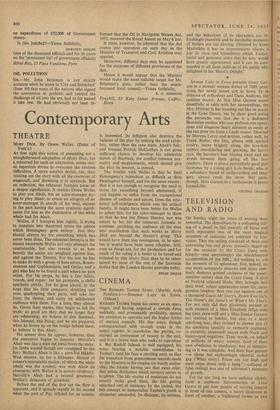Contemporary Arts
THEATRE
AT first sight this notion of presenting not a straightforward adaptation of Moby Dick, but a...rehearsal for such an adaptation, seems only
an ingenious device to overcome the obvious difficulties. A more sensible device, too, than tricking out the story with all the resources of stagecraft, and drowning it in spectacle. But
on reflection, the rehearsal formula takes on a deeper significance. It enables Orson Welles
to play not Ahab, but an actor-manager try- ing to play Ahab; to create an allegory of an actor-manager in search of his soul, success in the part having the same symbolic signifi- cance for him as the destruction of the white whale had for Ahab.
Welles, if I interpret him rightly, is trying to translate into theatrical terms the advice which Hemingway gave writers: that they should always try for something which has never been done. The rehearsal formula is the means wherewith Welles not only attempts the unattainable, but also reveals to us how heavily the scales are weighted against him, and against the Theatre. For his cast he has to make do with a group of ham actors, Rosen- crantzes and Guildensterns and Osrics; and a girl who has to be found a part where no part exists. For his props, he has a few tables, boards, and ropes: for his prospects, a chilly apathetic public. Yet he goes ahead, in the hope that his little company, doubling and even quadrupling their parts, will take fire from the theme, and carry an exhilarated audience with them. For a time, they almost do. Given their masks, they begin to tell the truth; so good are they that we forget they arc rehearsing; we believe in this Starbuck, this Ishmael, this Meg; and we are prepared, when he looms up on the bridge behind them, to believe in this Ahab.
No sooner does he appear, however, than the enterprise begins to founder. Melville's Ahab was like a man cut away from the stake, his limbs wasted though not consupcd by the fire: WeIles's Ahab is like a corn-Ted Middle- West senator, up for a filibuster. Hatred of is travestied. Its inflation also destroys the balance of the play by making the mad cabin- boy, rather than the sane mate, Ahab's foil : and because Patrick McGoohan is not given sufficient chance to develop his admirable sketch of Starbuck, the conflict between nor- mality and megalomania, which should give the play its tension, is missed.
The trouble with Welles is that he finds Hemingway's injunction as difficult as does Hemingway himself, and for the same reason : that it is not enough to recognise the need to strive for something beyond attainment, if you happen to suffer from the occupational disease of authors and actors, from the emo- tional self-indulgence which rots the critical faculty. It might have been better for Welles to admit this; for his actor-manager to show us that he was not Prince Hamlet, nor was meant to be; for the rehearsal formula to continue, prodding the audience all the time into recollection that such works as Moby Dick are beyond the theatre's grasp. This would have been less courageous, to be sure; but it would have been more effective. Still, even as things arc, for the production and for much of the acting it is better to be bored and irritated by this Moby Dick than to be enter- tained by most of the rest of the facetious frolics that the London theatre provides today,
BRIAN INGLIS

















































 Previous page
Previous page